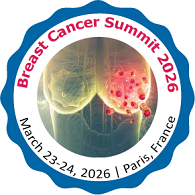Call for Abstract
Scientific Program
16th World Congress on Breast Cancer Research & Therapies, will be organized around the theme “From Early Detection to Advanced Treatment: A Comprehensive Approach”
Breast Cancer Summit 2026 is comprised of keynote and speakers sessions on latest cutting edge research designed to offer comprehensive global discussions that address current issues in Breast Cancer Summit 2026
Submit your abstract to any of the mentioned tracks.
Register now for the conference by choosing an appropriate package suitable to you.
Dive into the complexities of TNBC, a particularly aggressive subtype. The track will highlight advancements in molecular characterization, novel treatment options like PARP inhibitors and checkpoint inhibitors, and current research aimed at understanding its heterogeneity. Multidisciplinary approaches to improve patient outcomes will be emphasized.
Explore the latest diagnostic innovations including AI-assisted imaging, liquid biopsies, and molecular profiling. This track covers early detection strategies, screening protocols, and biomarkers that enhance diagnostic accuracy and help reduce false positives and overdiagnosis. Discussions will also include personalized diagnostics for high-risk populations and integration of precision imaging in clinical practice.
Focused on HER2-targeted therapies such as trastuzumab, pertuzumab, and novel agents like tucatinib, this track dives into treatment evolution and resistance challenges. Attendees will explore dual HER2 blockade, ADCs, and the role of HER2-low classification in guiding future treatment landscapes.
This track delves into the complexities of diagnosing and managing breast cancer during pregnancy. Topics include safe imaging practices, treatment timing, maternal-fetal outcomes, and ethical considerations. It’s an essential session for both oncologists and obstetric care providers.
From mammography to MRI and contrast-enhanced imaging, this track highlights cutting-edge radiological techniques. Explore the role of AI, radiogenomics, and real-time image-guided biopsy procedures. A must-attend for radiologists and technologists involved in breast cancer detection and monitoring.
Explore the evolving role of radiation oncology including hypofractionation, proton therapy, and intraoperative radiotherapy. Sessions will focus on reducing toxicity, improving targeting accuracy, and optimizing treatment timing in multidisciplinary care models.
This session highlights mental health support, survivorship planning, and rehabilitation. Attendees will learn about managing fatigue, anxiety, body image issues, and long-term treatment side effects. Holistic care approaches and integrative oncology practices are also discussed.
Focusing on modifiable risk factors, this track explores lifestyle interventions, dietary influence, physical activity, and chemoprevention strategies. Public health initiatives and education campaigns aimed at prevention will be featured.
This track focuses on the latest therapeutic strategies including targeted therapies, immunotherapies, and antibody-drug conjugates. Experts will discuss treatment customization based on tumor genetics, emerging clinical trial outcomes, and strategies to minimize toxicity. It’s a comprehensive look at how innovation is reshaping therapeutic paradigms in breast cancer care.
This track examines updates in endocrine therapies, resistance mechanisms, and combination strategies for ER/PR-positive breast cancer. Learn about next-generation SERDs, CDK4/6 inhibitors, and how genomic profiling is refining hormone-driven treatment planning. Patient management and long-term survivorship challenges will also be covered.
Addressing the unique challenges faced by younger patients, this track highlights fertility preservation, psychosocial aspects, aggressive tumor biology, and tailored treatment approaches. Discussions will also cover hereditary syndromes, genetic counseling, and long-term survivorship considerations for this patient population.
Explore hereditary breast cancer syndromes with a focus on BRCA1/2 and beyond. This track covers genetic screening protocols, risk-reducing strategies, implications for family members, and targeted therapies for mutation carriers. Genetic counseling and population-specific mutation profiles will also be discussed.
This track offers insights into modern surgical techniques such as nipple-sparing mastectomy, oncoplastic surgery, and sentinel lymph node biopsy. It will also cover patient-centric decisions around breast conservation versus mastectomy, and advancements in minimally invasive procedures.
This track discusses innovations in reconstructive techniques post-mastectomy, including autologous tissue reconstruction, implant-based options, and 3D surgical planning. Emphasis is placed on achieving oncologic safety alongside aesthetic and psychological recovery.
Often overlooked, male breast cancer poses unique diagnostic and therapeutic challenges. This track addresses epidemiology, clinical presentation, and gender-specific treatment protocols while raising awareness about early detection and stigma reduction.
Discover how AI, machine learning, and big data are transforming breast cancer research and patient care. This track will showcase predictive analytics, decision-support tools, and AI-integrated imaging diagnostics, offering a glimpse into the future of personalized oncology.

